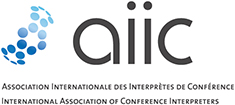If you love languages and believe in multilingual communication, becoming a conference interpreter can be an exciting career choice.
Conference interpreters have the chance to work in many different multilingual situations. You might find us working in non-governmental organisations, at private conferences, international tribunals or at global events.
Some of us are full-time employees, others work as freelancers, managing our own schedules.
What does it take to be a conference interpreter?
There is no ideal profile for a conference interpreter.
Some of us grew up speaking more than one language, some of us discovered a passion for languages when we were at school, or even after starting a different career.
Being bilingual is not a requirement, nor does it guarantee that this will be the career for you.
While an in-depth knowledge of your working languages and their cultures is essential for any interpreter, being a successful conference interpreter requires more than just language skills.
Is conference interpreting for me?
There are many different types of interpreters in the world. You can find interpreters working in communities, for governments, in courts; others support medical staff, military personnel or aid agencies in the field. Anywhere where multilingual communication is required, there are interpreters. But only a small percentage of them are conference interpreters.
Why? Interpreting in a conference setting can be particularly intense, requiring a cool head and the ability to multitask and perform under pressure.
Interpreting schools call this ability ‘aptitude’. Professional courses will test your aptitude to be a conference interpreter before allowing you to enrol on their course. If you decide that conference interpreting could be the career for you, you can find courses which offer your working languages in the AIIC Schools Directory. All schools listed here meet AIIC’s assessment criteria for interpreting programmes, which include aptitude testing as part of their admissions procedure.
Find an Interpreting Programme
Learn more
Useful resources for learning more about training as a conference interpreter.
EU Commission Knowledge Centre on Interpretation
SCICtrain – Training modules for interpreting students
ORCIT – resources for student interpreters


